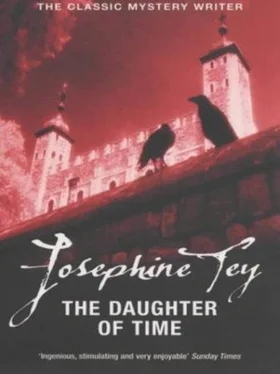‘Known? About what?’
‘About Richard not having killed the boys at all, and all that.’
‘They’ve known? Since when!’
‘Oh, hundreds and hundreds of years.’
‘Pull yourself together, chum. It’s only four hundred years altogether since the thing happened.’
‘I know. But it doesn’t make any difference. People have known about Richard’s not doing it for hundreds and hundreds—’
‘Will you stop that keening and talk sense. When did this – this rehabilitation first begin?’
‘Begin? Oh, at the first available moment.’
‘When was that?’
‘As soon as the Tudors were gone and it was safe to talk.’
‘In Stuart times, you mean?’
‘Yes, I suppose – yes. A man Buck wrote a vindication in the seventeenth century. And Horace Walpole in the eighteenth. And someone called Markham in the nineteenth.’
‘And who in the twentieth?’
‘No one that I know of.’
‘Then what’s wrong with your doing it?’
‘But it won’t be the same, don’t you see. It won’t be a great discovery!’ He said it in capitals. A Great Discovery.
Grant smiled at him. ‘Oh, come! You can’t expect to pick Great Discoveries off bushes. If you can’t be a pioneer what’s wrong with leading a crusade?’
‘A crusade?’
‘Certainly.’
‘Against what?’
‘Tonypandy.’
The boy’s face lost its blankness. It looked suddenly amused, like someone who has just seen a joke.
‘It’s the damnedest silliest name, isn’t it!’ he remarked.
‘If people have been pointing out for three hundred and fifty years that Richard didn’t murder his nephews and a schoolbook can still say, in words of one syllable and without qualification, that he did, then it seems to me that Tonypandy has a long lead on you. It’s time you got busy.’
‘But what can I do when people like Walpole and those have failed?’
‘There’s that old saying about constant water and its effect on stone.’
‘Mr Grant, right now I feel an awfully feeble little trickle.’
‘You look it, I must say. I’ve never seen such self-pity. That’s no mood to start bucking the British public in. You’ll be giving enough weight away as it is.’
‘Because I’ve not written a book before, you mean?’
‘No, that doesn’t matter at all. Most people’s first books are their best anyway; it’s the one they wanted most to write. No, I meant that all the people who’ve never read a history book since they left school will feel themselves qualified to pontificate about what you’ve written. They’ll accuse you of whitewashing Richard; “whitewashing” has a derogatory sound that “rehabilitation” hasn’t, so they’ll call it whitewashing. A few will look up the Britannica, and feel themselves competent to go a little further in the matter. These will slay you instead of flaying you. And the serious historians won’t even bother to notice you.’
‘By God, I’ll make them notice me!’ Carradine said.
‘Come! That sounds a little more like the spirit that won the Empire.’
‘We haven’t got an Empire,’ Carradine reminded him.
‘Oh, yes, you have,’ Grant said equably. ‘The only difference between ours and yours is that you acquired yours, economically, in the one latitude, while we got ours in bits all over the world. Had you written any of the book before the awful knowledge of its unoriginality hit you?’
‘Yes, I’d done two chapters.’
‘What have you done with them? You haven’t thrown them away, have you?’
‘No. I nearly did. I nearly threw them in the fire.’
‘What stopped you?’
‘It was an electric fire.’ Carradine stretched out his long legs in a relaxing movement and began to laugh. ‘Brother, I feel better already. I can’t wait to land the British public one in the kisser with a few home truths. Carradine the First is just raging in my blood.’
‘A very virulent fever, it sounds.’
‘He was the most ruthless old blaggard that ever felled timber. He started as a logger and ended up with a Renaissance castle, two yachts, and a private car. Railroad car, you know. It had green silk curtains with bobbles on them and inlay woodwork that had to be seen to be believed. It has been popularly supposed, not least by Carradine the Third, that the Carradine blood was growing thin. But right now I’m all Carradine the First. I know just how the old boy felt when he wanted to buy a particular forest and someone said that he couldn’t have it. Brother, I’m going to town.’
‘That’s nice,’ Grant said, mildly. ‘I was looking forward to that dedication.’ He took his writing-pad from the table and held it out. ‘I’ve been doing a policeman’s summing-up. Perhaps it may help you when you come to your peroration.’
Carradine took it and looked at it with respect.
‘Tear it off and take it with you. I’ve finished with it.’
‘I suppose in a week or two you’ll be too busy with real investigations to care about a – an academic one,’ Carradine said, a little wistfully.
‘I’ll never enjoy one more than I’ve enjoyed this,’ Grant said, with truth. He glanced sideways at the portrait which was still propped against the books. ‘I was more dashed than you would believe when you came in all despondent, and I thought it had come to pieces.’ He looked back at the portrait and said: ‘Marta thinks he is a little like Lorenzo the Magnificent. Her friend James thinks it is the face of a saint. My surgeon thinks it is the face of a cripple. Sergeant Williams thinks he looks like a great judge. But I think, perhaps, Matron comes nearest the heart of the matter.’
‘What does she say?’
‘She says it is a face full of the most dreadful suffering.’
‘Yes. Yes, I suppose it is. And would you wonder, after all.’
‘No. No, there was little he was spared. Those last two years of his life must have happened with the suddenness and weight of an avalanche. Everything had been going along so nicely. England on an even keel at last. The civil war fading out of mind, a good firm government to keep things peaceful and a good brisk trade to keep things prosperous. It must have seemed a good outlook, looking out from Middleham across Wensleydale. And in two short years – his wife, his son, and his peace.’
‘I know one thing he was spared.’
‘What?’
‘The knowledge that his name was to be a hissing and a byword down the centuries.’
‘Yes. That would have been the final heart-break. Do you know what I personally find the convincing thing in the case for Richard’s innocence of any design for usurpation?’
‘No. What?’
‘The fact that he had to send for those troops from the North when Stillington broke his news. If he had had any fore-knowledge of what Stillington was going to say, or even any plans to concoct a story with Stillington’s help, he would have brought those troops with him. If not to London then to the Home Counties where they would be handy. That he had to send urgently first to York and then to his Nevill cousins for men is proof that Stillington’s confession took him entirely unawares.’
‘Yes. He came up with his train of gentlemen, expecting to take over the Regency. He met the news of the Woodville trouble when he came to Northampton, but that didn’t rattle him. He mopped up the Woodville two thousand and went on to London as if nothing had happened. There was still nothing but an orthodox Coronation in front of him as far as he knew. It wasn’t until Stillington confessed to the council that he sends for troops of his own. And he has to send all the way to the North of England at a critical moment. Yes, you’re right, of course. He was taken aback.’ He propped the leg of his spectacles with a forefinger in the old tentative gesture, and proffered a companion piece. ‘Know what I find the convincing thing in the case for Henry’s guilt?’
Читать дальше












